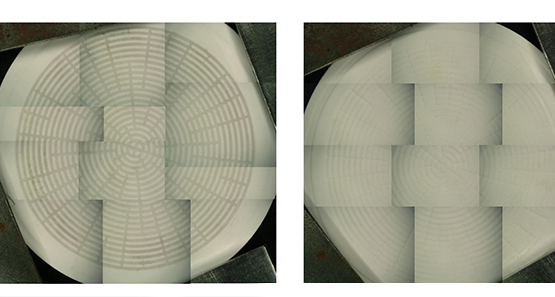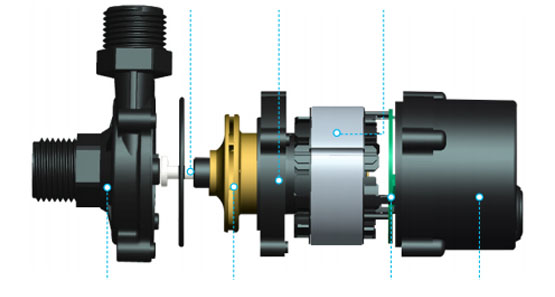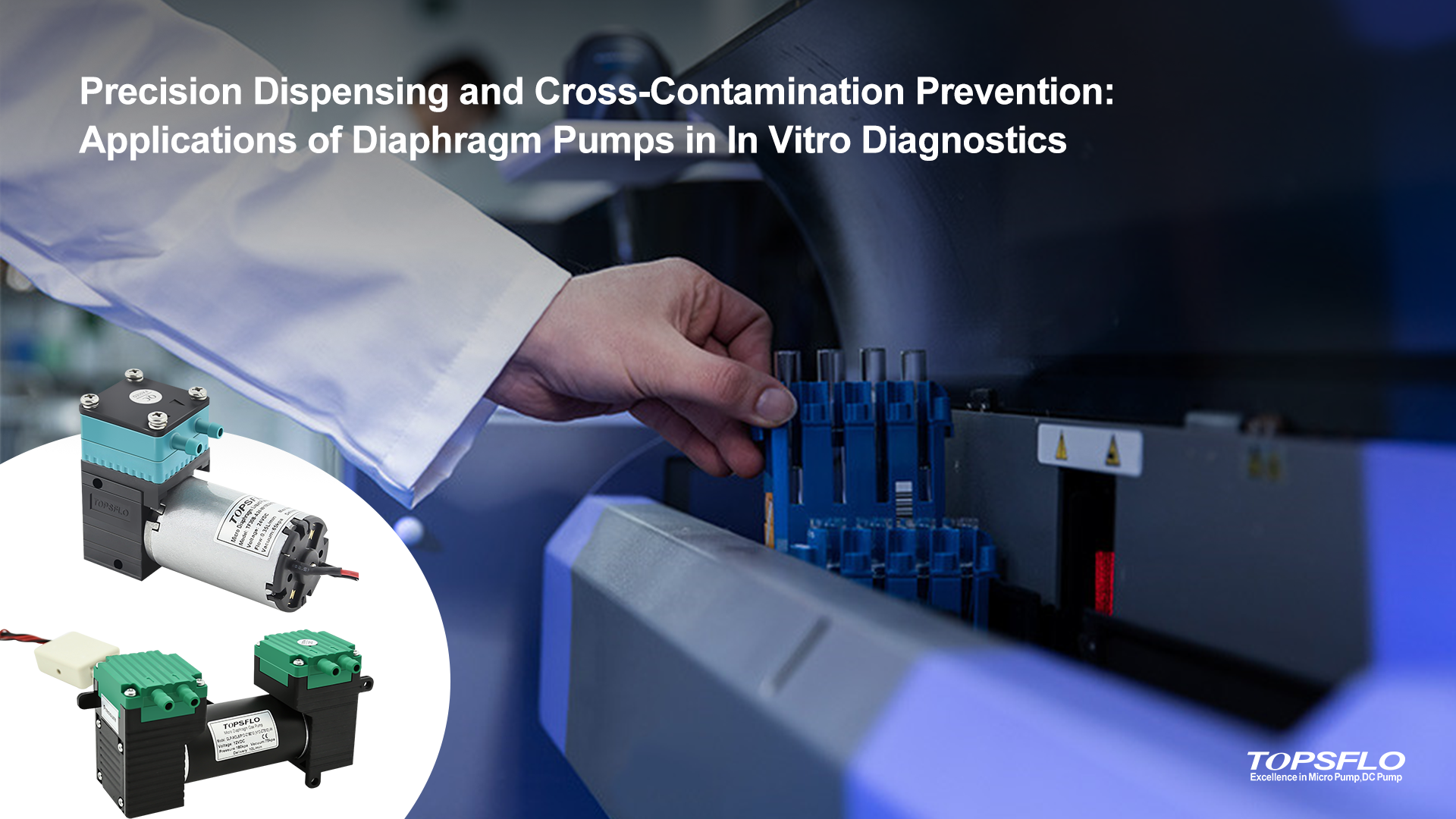IVD (In Vitro Diagnosis) in vitro diagnostic water pump refers to the brushless centrifugal water pump used in the temperature control system, cooling system, liquid sample transmission and equipment cleaning system of IVD in vitro diagnostic equipment. IVD refers to a product that obtains clinical diagnostic information by testing human samples (blood, body fluids, tissues, etc.) outside the human body. IVD sub-sectors are divided into: immunodiagnosis, biochemical diagnosis, molecular diagnosis, microbial diagnosis, blood diagnosis, POCT (point-of-care diagnosis), etc. Among them, biochemical analyzers, chemiluminescence equipment, gene sequencers, etc. all need to use brushless circulation pumps.
In the long-term cooperation with customers, Doppler Pumps cooperates with well-known customers at home and abroad to research pumps that best match the medical industry. IVD analytical instruments have high requirements on the cleanliness of equipment pipelines, and even require no impurities to be precipitated under a 200-fold microscope to avoid any bacteria. Doppler brushless centrifugal pumps are made of food-grade raw materials, precision-crafted, stable in operation, maintenance-free for long-term use, and perfectly match the needs of high-end medical equipment. Truly achieve 0 impurities and 0 cross-contamination, and help medical equipment to feed back the most authentic and reliable test data.


In Vitro Diagnostics Pumps Series by TOPSFLO
Voltage 24V
Max Flow 11L/min
Max Water Head 12M
Voltage 12V 24V
Max Flow 9L 12L/min
Max Water Head 5M 8M
Voltage 12V 24V
Max Flow 16L 24L/min
Max Water Head 8M 11M
Voltage 12V 24V
Max Flow 16L 24L/min
Max Water Head 8M 11M
2.Enhancing Diagnostic Efficiency: Micro Medical Pump Technology in IVD Devices
3.TOPSFLO pumps meet the rigorous cleanliness standards required in the IVD industry.
Introduction:
In the realm of in vitro diagnostics (IVD), precision and accuracy are paramount for reliable test results. The advent of mini diaphragm pumps has significantly contributed to enhancing these qualities by providing precise dispensing capabilities and preventing cross-contamination. This article explores the applications of mini diaphragm pumps in IVD, shedding light on their crucial role in ensuring the integrity of diagnostic processes.

Precision Dispensing in IVD:
Diaphragm pumps play a pivotal role in the precise dispensing of reagents and samples in IVD procedures. Their ability to control flow rates and deliver small, accurate volumes is particularly valuable in assays where minute quantities of substances can make a substantial difference. The precise dispensing facilitated by diaphragm pumps ensures that diagnostic tests achieve the required sensitivity and specificity, leading to more accurate and reliable results.
Cross-Contamination Prevention:
Cross-contamination is a persistent concern in diagnostic settings, as it can compromise the validity of test results and lead to erroneous conclusions. Miniature diaphragm pumps address this challenge by employing a barrier, the diaphragm, that isolates the pumped fluid from the pump mechanism. This design prevents the backflow of samples or reagents, minimizing the risk of contamination between different test samples. As a result, diaphragm pumps contribute significantly to the robustness of IVD processes and enhance the credibility of diagnostic outcomes.
Applications in Automated Systems:
The integration of mini diaphragm liquid and gas pumps into automated IVD systems has become increasingly prevalent. These pumps play a crucial role in automating complex assay protocols, where precise and programmable fluid dispensing is essential. Automated systems equipped with mini diaphragm pumps not only increase efficiency but also reduce the likelihood of human errors, further improving the overall reliability of diagnostic procedures.
Versatility in IVD Platforms:
Diaphragm pumps exhibit versatility in their application across various IVD platforms. Whether used in immunoassays, molecular diagnostics, or clinical chemistry, these pumps prove adaptable to the unique requirements of different diagnostic techniques. The compatibility of diaphragm pumps with a wide range of reagents and samples enhances their utility across diverse diagnostic applications, making them a valuable component in the IVD landscape.
Conclusion:
The application of mini diaphragm pumps in in vitro diagnostics represents a significant advancement in ensuring precision dispensing and preventing cross-contamination. Their role in enhancing the accuracy, reliability, and efficiency of diagnostic processes cannot be overstated. As technology continues to evolve, the integration of micro diaphragm pumps into IVD platforms is likely to grow, contributing to further improvements in diagnostic capabilities and ultimately benefiting patient care.
Fully Automated Biochemical Analyzer
Biochemical diagnosis, the earliest automated detection method, remains one of the most commonly used techniques in in vitro diagnostics. It is applied to blood tests, urine analysis, liver and kidney function, glucose metabolism, inflammation, pancreas, tumor screening, coagulation, and more.
A fully automated biochemical analyzer automates all or part of the diagnostic steps, replacing manual operations like sampling, mixing, thermostatic waterbath detection, result calculation, judgment, display, and printing results, as well as machine cleaning processes.
Fully Automated Chemiluminescence Immunoassay Analyzer
This analyzer performs immunoassays on human serum samples. It consists of a reagent area, a sample area, a sample addition area, and a waste liquid area for disposal. Chemiluminescence technology has become a leading diagnostic method and its market share continues to grow. Compared to biochemical diagnosis, chemiluminescence is used in broader applications and addresses challenges that other immunological methods cannot.
Automatic Tripartite Group Blood Cell Analyzer
Blood cell analysis involves the examination of visible cellular components of blood, including red blood cells, white blood cells, and platelets. The tripartite group blood cell analyzer operates based on Coulter’s principle, using electrical impedance to measure resistance changes as blood cells pass through a counting aperture in an electrolyte solution. This method helps in accurately counting and measuring the volume of blood cells.
Liquid Medical Waste Handling Pump
In the medical field, handling liquid medical waste safely and efficiently is a critical requirement, especially in diagnostic and treatment settings. TOPSFLO offers specialized liquid medical waste handling pumps, designed to manage liquid waste generated during various medical procedures and diagnostics. These pumps ensure that liquid waste is transported safely, minimizing contamination risks and adhering to stringent medical waste disposal regulations.
What Can TOPSFLO Pumps Offer?
In collaboration with both domestic and international clients, TOPSFLO has developed high-end medical devices pump solutions for the industry, specifically in temperature control, cooling systems, liquid sample transmission, equipment cleaning, and liquid medical waste handling. TOPSFLO’s brushless centrifugal pumps meet the stringent cleanliness standards of IVD instruments, ensuring that no impurities are present under a 200-fold microscope, which prevents bacterial contamination. Made from food-grade materials, with precise manufacturing, stable operation, and long-term durability, these pumps offer maintenance-free performance and zero cross-contamination, ensuring accurate and reliable test data from medical equipment.
With years of experience in the medical and beauty equipment sectors, TOPSFLO provides effective micro-pump solutions tailored to customer needs, offering high-quality, competitive products for various sub-sectors. We invite prospective customers to discuss their needs with us, and our engineers will provide the most reliable solutions.
Recommend you also directly send and email to info@topsflo.com to get our fastest response.
